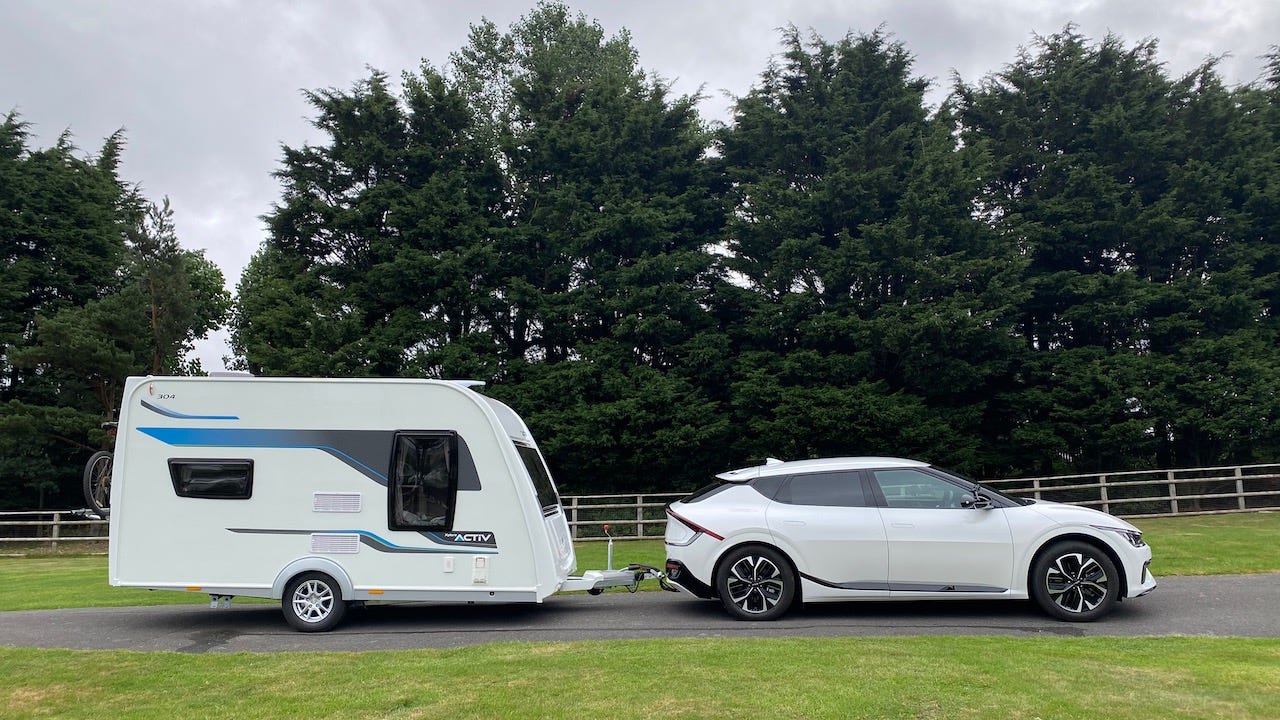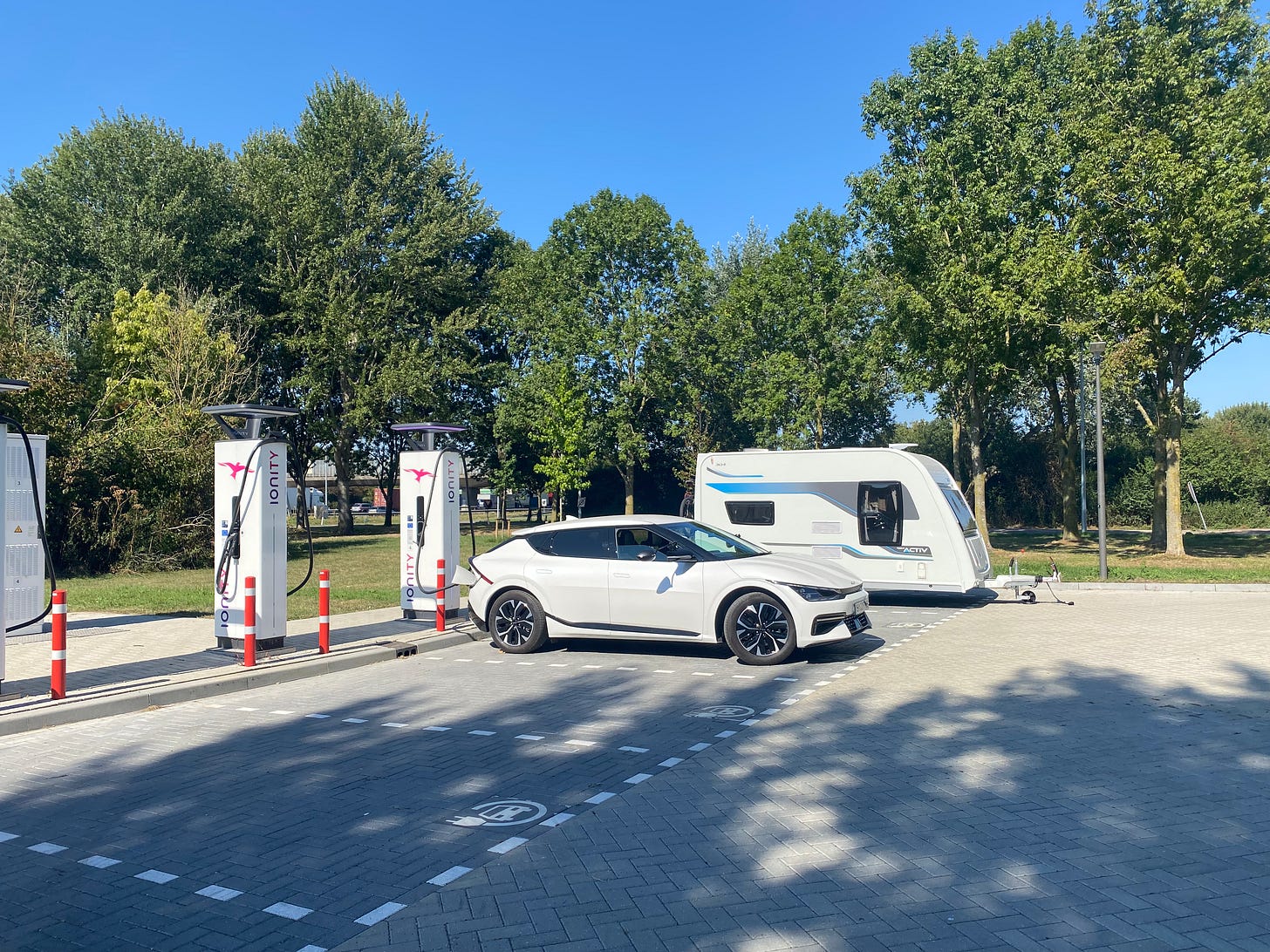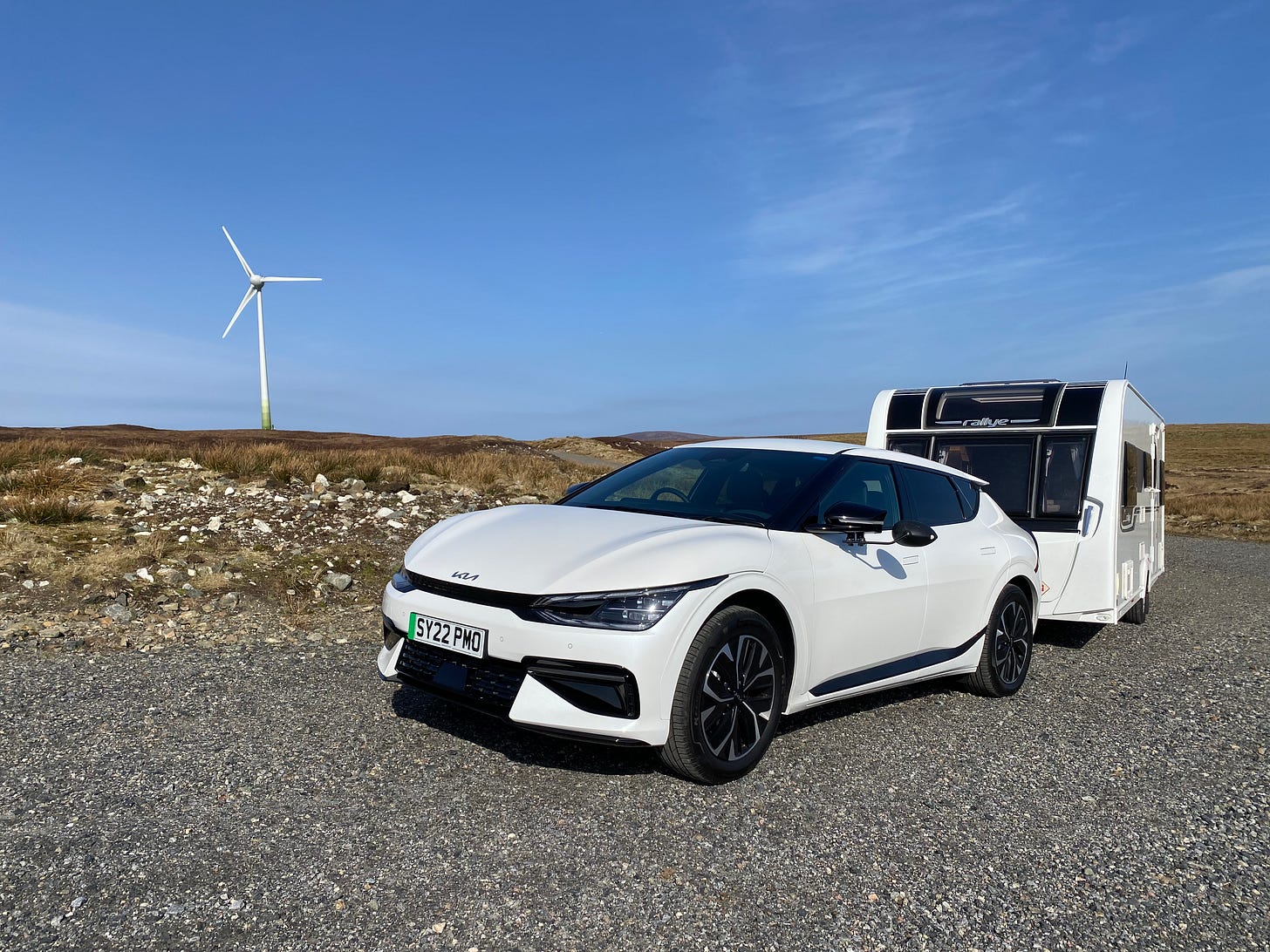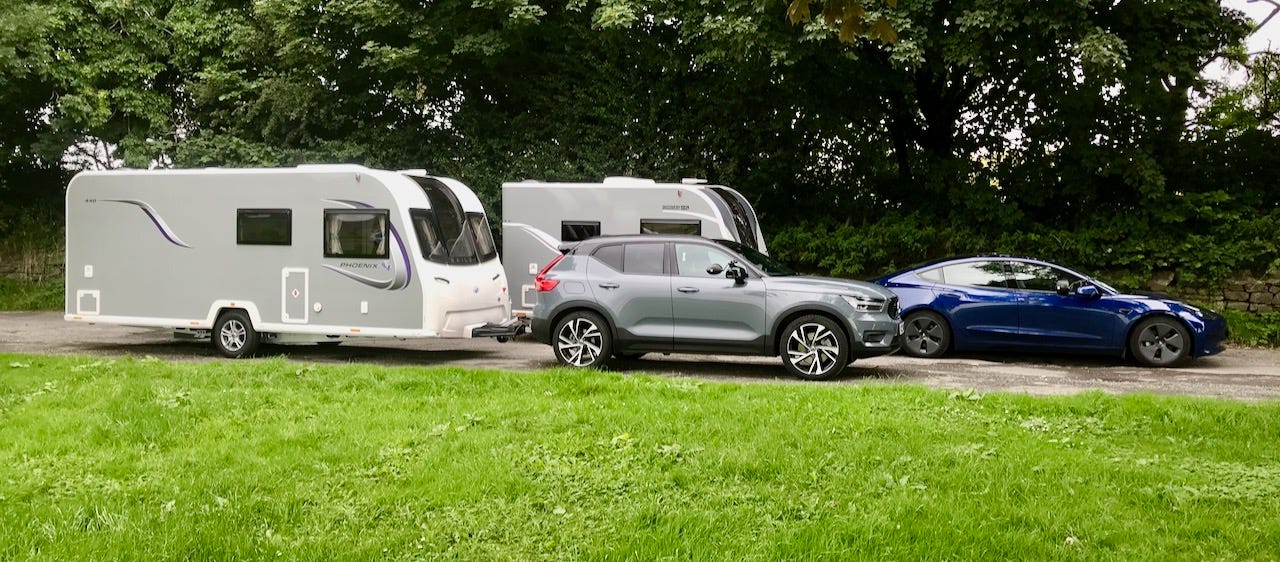Towing with an EV - is it for me?
If you tow a caravan or any kind of camping trailer, read this to help you decide
October 2022
It’s hard to get clear, impartial facts and advice to help you decide whether or not an EV is for you if you tow a caravan, trailer tent, or a folding camper.
In this post we’ll look at the Pros and Cons of towing with an EV, as well as dispel some popular myths and reveal some surprising truths.
The Advantages of Towing with an EV
There are so many advantages of towing with an EV:
Stress-free driving experience
Quiet, calm experience in the cabin
Powerful, instant torque
Serene manoeuvring on site
If you have off-road parking, the convenience of charging at home
Lower overall running costs (at least for now)
Lower whole-life carbon emissions
V2L - some EVs can be used as Electric Hook-ups for your caravan
It’s hard to put into words just what an awesome experience it is towing with a Battery Electric Car. You just put your foot down, and you silently move off almost as if the caravan or camping trailer isn’t there. The cabin is silent, bar the roll of the tyres on the tarmac. Manoeuvring on site is stress-free with zero engine noise and zero revs. At the moment, running costs of an EV are cheaper than those of an ICE vehicle.
The Disadvantages of Towing with an EV
Purchase Price is higher than the ICE equivalent
Public Charging Network is not set up for cars that are towing
You need to plan trips and charging stops very carefully
Some people may get defensive about your decision
Even if you were planning on spending over £40k on your new car, an EV is still more expensive to buy than the petrol or diesel equivalent. Only a handful of EVs on the used market are able to tow - and these tend to be at the executive end of the market, negating any saving on buying a new Kia, Hyundai, or Skoda.
Sadly, the charging network in the UK is not as reliable as it could be, and in over 90% of cases is not trailer-friendly - you’ll need to detach the caravan in order to charge the car.
If you’re going to tow over 120-150 miles, you’ll need to plan your route and plan your charging stops. Part of that planning process is checking out motorway service areas on Google Maps to make sure that you won’t get caught up in a rigid one-way system that doesn’t allow you to get back to the chargers after dropping the caravan/camping trailer, or vice versa.
The Opinions of Others
There are some people who have gleaned their ‘facts’ from Twitter or Facebook who seem to think that you know nothing about EVs and will grace you with their knowledge and opinion, whether you’ve asked for it or not.
In other words, some people get very defensive about EVs. Trust me, I know. Defensive behaviour takes the forms of verbal or written attacks, denial, fabrication, or gaslighting, i.e. calling other people stupid or ill-informed.
What causes people to get so defensive?
Clinical Psychologist Seth Meyers wrote:
Someone gets defensive as a means of avoiding accountability
Psychologists agree that defensive behaviour has the purpose of protecting the individual from feelings of hurt and shame. The objective is to shift attention to the faults of the other person so they feel better about themselves in the short term.
Owning an EV as a towing vehicle definitely requires a level of commitment that is not required when towing with an ICE vehicle.
FAQs about Towing with an EV
Are EVs truly green?
The greenest car the one you already have. Over their whole lives, EVs are greener than an ICE. More carbon is produced in the manufacture of EVs compared to ICEs, but less is produced in use.
In this fascinating article from Reuters, they talk about the calculation for the break even point where an EV has recouped the excess carbon emitted in its manufacture and is now greener than its ICE equivalent.
There are many variables associated with such a calculation, such as the source of electricity. You’ll hit break even point way quicker in Norway where almost all power is renewable than you would in Poland where most power is generated using fossil fuels.
EV manufacturers tend to keep quiet about the break even point in each market, but conversations I’ve had with environmental experts would put a car like the Kia EV6 at about 60,000 miles in the UK. It sounds a bit high to me, but until I find statistics to the contrary, that’s just how it is.
At least EVs lack Tail-pipe emissions, making for cleaner air in cities and around busy roads.
Is the electricity that powers EVs generated by burning coal?
According to the National Grid, in 2020 renewables accounted for 43.1% of the UK’s electricity generated, outstripping fossil fuels over the course of the year.
In 2010 fossil fuels accounted for over 75% of the UK’s electricity generation. In 2021 that was down to just 35%
Figures for Scotland are even better. While Scotland could produce 97% of its electricity from renewables, it exports some of this. But the figures are still encouraging, with 56% of the energy consumed in Scotland coming from renewables and just 13% from fossil fuels (source: Full Fact).
Given the looming energy crisis, could you end up paying a higher cost per mile than the petrol or diesel equivalent?
The short answer is yes, you could, in a couple of exceptional cases.
I’ve calculated that at today’s prices, if you get 25 mpg when towing with an ICE and 40 mpg solo, and 2 mi/kWh towing and 4 mi/kWh solo in an EV, the cut off point when paying to charge your EV is about 70p/kwh towing, and about 87p/kwh solo.
Gridserve is the most prolific motorway network and charges about 50p/kwh for rapid and ultra-rapid charging, Shell is 66p/kWh, connected kerb is 35p/kWh for fast charging, Pod Point at Lidl is 28p/kWh for a rapid charge, and Pod Point at Tesco is often free, but it’s a slow charge.
However, even with projected increases in energy costs, while one or two charging sessions might be more expensive than the fossil fuel equivalent, the running costs of an EV look set to remain far lower than an ICE
If everyone got an EV, would there be the capacity to generate enough electricity to power them?
Renewable energy can satisfy the demand, but the main issue is that because it’s not available on demand, it’s dependent on natural forces. We need ways to store excess energy to satisfy demand when insufficient energy is generated, which is known as grid balancing. EVs could in theory be a part of the solution, storing the excess energy in their batteries and releasing it back into the grid during times of peak demand.
How long does an EV battery last?
There are so many cells in a typical EV battery that they retain capacity even after hundreds of thousands of miles; Although they won’t perform as well as when box-fresh and new, they will keep holding charge for many, many years to come and the internet is full of high-mileage electric and hybrid cars still working well into their dotage. The expected electric car battery life is at least a decade and our advice is your car will fall apart before your battery fails.
Manufacturers offer warranties of between 7 and 10 years and 100,000 miles on the batteries in their EVs.
What about Hydrogen?
Right now, 95% of the hydrogen produced in the UK is produced from fossil fuels, with only 5% coming from renewable sources.
That 95% - known as grey, blue, or turquoise hydrogen- is produced using, you guessed it, fossil fuels. Turquoise is the less impactful of the three as the solid carbon by-product is either sold for industrial use or stored in good old landfill.
Green hydrogen - hydrogen made from water - seems to be the answer. But to convert water to hydrogen requires a process called electrolysis, a process that consumes electricity — and lots of it.
While Hydrogen has the advantages of faster fill-ups and greater energy density for the vehicle, it is a far less efficient use of electricity.
With a Battery Electric Vehicle, there is 5% energy lost at charging; battery charging and discharging loses a further 10%, and the motor wastes 5% giving a total loss of 20%.
For a Hydrogen Fuel Cell Electric Vehicle, electrolysis is only 75% efficient; compressing the gas, chilling it, and transporting it loses 10%, converting the hydrogen back to electricity is only 60% efficient, and then you have the same 5% loss from the motor. This makes for total energy loss of 62% - three times greater than battery.
In other words, for each kW of energy, a BEV returns 800w, and hydrogen 380w, less than half. And remember, 95% of the UK’s hydrogen is produced from fossil fuels.
Source: (Murgitroyd - Dr Alan Jones and Dr Martin Neilson)
However…
According to Auto Express on 31st January 2022, hydrogen is a viable alternative to BEV tech, its biggest drawback right now being the lack of infrastructure - just 11 Hydrogen stations exist in the UK.
In terms of overall carbon emissions, green hydrogen is favourable compared to lithium-ion batteries, which are not green. But in years to come, we could be transitioning to Solid State Batteries.
Will Solid State Batteries render lithium-ion batteries obsolete in the next year or two?
Solid state batteries are tipped to revolutionise EV technology. They do not rely on precious metals, they have greater energy density than lithium-ion batteries to offer even better range (and therefore need fewer charging stops), and can charge very quickly.
In an interview in the Financial Times on 11 Sept 22, Hiroaki Koda, President of one of the largest and most influential battery ventures twinning Toyota and Panasonic, said that Solid-state batteries becoming a game-changer is still far away. He added that liquid-based lithium-ion batteries would remain dominant for the next 10 years.
TO SUM UP
Towing with an EV is an awesome experience
The greenest car is the car you already have
EV tech is evolving rapidly but li-ion batteries should be with us for a good 10 years yet
Towing journeys over 100-150 miles may need charging stops which often involve detaching the caravan
IS AN EV FOR ME?
I am not sponsored by motor manufacturers. I’m not a huge organisation that’s in bed with the car industry, so I can speak freely and without prejudice.
If you are in the market for a £40k+ car, and you normally tow shorter distances or are willing to accept the current faff of detaching the caravan to charge the car, then I’d suggest you seriously consider an EV, because they deliver, in my opinion, a far superior towing experience than a fossil-fuelled car.
If you are in the market for a £40k+ car, and normally tow longer distances and are not prepared to accept the faff of detaching the caravan to charge, then consider a plug-in hybrid. You’ll benefit from some of the advantages of an EV, especially solo for shorter distances, with the back up of a combustion engine for towing. However, you have the additional weight and running costs of both systems on board.
If you are undecided and/or your existing set-up suits you fine, hold on to what you have. The longer you do that, the better EVs will become and the easier charging will be. Buying and consuming less is always the greenest option.
Do you already tour with an EV?
If so, please leave a comment detailing your own experience and constructive views to help those who are undecided. I look forward to learning about the joys and challenges of others!
Did you find value in this edition of Electric Touring?
If so, please subscribe and join the growing community of people who tour with EVs, or are interested in doing so.
Sharing is caring
I’d be really grateful if you could share this Newsletter with your friends online, on your social media platforms and on relevant forums that you enjoy.
Feeling Flush?
Electric Touring is self-funded and therefore completely independent. There are no adverts to spoil your experience. If you’d like to support us, and you’re in a position to do so, please consider Buying Me a Coffee using this link:
https://www.buymeacoffee.com/andrewditton
THANK YOU for your support.
Jargon Buster
ICE - Internal Combustion Engine, i.e. petrol or diesel car
V2L - Vehicle to Load, whereby you can draw 13 amps at 220v from a socket on the car







I tow my caravan with a Tesla Model X. Have taken it to Cornwall, Scotland and Norfolk from Oxfordshire with no stress.
The Tesla supercharging network makes all the difference. It’s reliable and generally well sited. I plan to tow my caravan with the MX down to Spain next year.
The range of my car when towing is equal to the capacity of my bladder, so no issue there.
Only real downside is as Andrew says, the need to unhitch most of the time when one is charging, however it’s a small price to pay for the lower cost per mile, and the sublime towing/driving experience. In particular the torque of an EV is phenomenal and suits towing perfectly
Andrews videos convinced me to commit to full electric and now we tow our 1600kg Coachman Amara with a Tesla model Y. I echo everything Andrew says about range (half of what you usually get) costs (much cheaper to run if you have home charging) and have found that charging on the tow every 100 miles is the perfect distance to stop with a family of a 5 and 7 year old who usually want a leg stretch anyway.
We're excited to explore further afield with an EV tow car and will be tuning into Andrew's videos and tapping into his experience all the way!